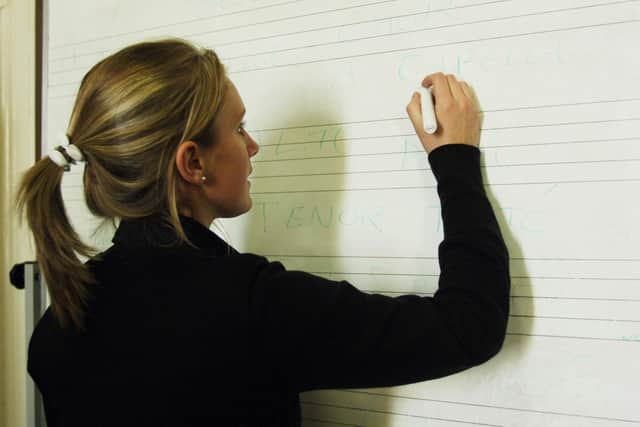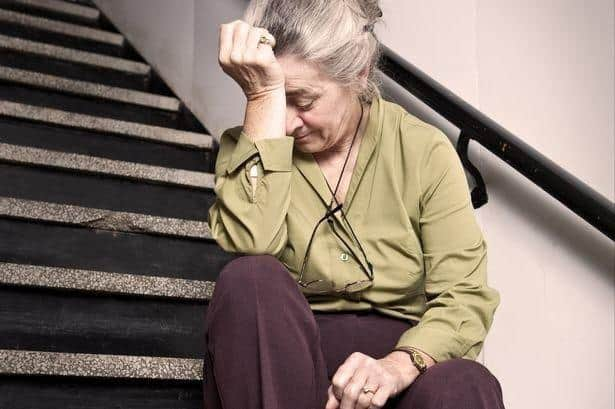Edinburgh schools: Teachers tell how being sworn at and punched by primary pupils has become 'normalised'
and live on Freeview channel 276
An Edinburgh primary school teacher, who has been in the profession for 20 years, says violence and aggression are now such an everyday part of life in the classroom that many colleagues are deciding to give up their career.
”In the past four years, just in my friendship group alone, I know four people in their early 30s, all working in Edinburgh, who have left teaching completely and have no intention of coming back,” he said. He says he and fellow teachers are “regularly sworn at” by children as young as five. “And they call you paedophiles – that's a favourite one.”
Advertisement
Hide AdAdvertisement
Hide Ad"When I started teaching in Edinburgh, the procedure was if a child swore at you they were automatically excluded. I'm not saying they should be excluded now, but it's just beome the norm. You have children as young as P1 telling you to 'F*** off' if you ask them to do something.


"I had a friend who had a tricky class – a lot of swearing at her, not listening to her, pushing her, a child was biting her. One day she ended up pulling into a car park on the way to work and having a breakdown. She had to phone another friend to come and pick her up because she couldn't drive and she was signed off with stress, purely because she was getting four or five incidents on a daily basis.
"She would go for her lunch and maybe someone would come into the staff room and say this child has done this outside – he's hit someone or kicked someone – and she was expected to go out and deal with this. There was no respite from it. You were dealing with these incidents during the day and then you were having to follow up after school, calling the parents or trying to find a resolution or maybe dealing with other children or adults who had been the victim of these incidents. It's all-consuming.
“When I started teaching, if you talked about one of these things in the staff room it would be 'Oh, my goodness'. But now it's everyday, it's just normalised.”


Advertisement
Hide AdAdvertisement
Hide AdHe said he had found a massive difference in behaviour since Covid, One class he knew had been quite well behaved before the pandemic. “But when came back they couldn't sit in a classroom, they couldn’t be amongst each other without fighting, they couldn't fit back into the normal classroom environment. Colleagues at high school, noticed the same thing – they had children walking out of class, saying 'I'm not doing that'.”
He believes having more support staff – like Pupil Support Assistants (PSAs) – is crucial to improving the situation. “Good support staff can reach children. They can have a different relationship with children that perhaps we can't as teachers because they can take them out, they can speak to them.”
But he is critical of the way teachers who are the victims of violence and aggression are sometimes treated. “I've been punched two or three times,” he said. “But on one occasion it was blamed on me – what did you do to cause this child to punch you?
“This child was hitting another child in the class, so I said 'You can't do that' and he turned round and punched me. I told him 'You can't hit people' and he said 'Well, you hit me - you've been doing it for years'. I reported it to my line manager – I was less worried about being punched than I was about the accusation. This child was excluded for an afternoon and then he was back in class. He was leaving the school and he was at the leavers' party and all that. So to my mind, there was no consequence.
Advertisement
Hide AdAdvertisement
Hide Ad“He'd made a similar accusation against another teacher, claiming he'd hit him, and they interviewed all the children in the class. The teacher felt disbelieved and ended up leaving the profession. There is a feeling that if something happens to you, you're almost put on trial as well, you're not believed. You're pulled into a headteacher's office and you're spoken to in the same way a child is.”
And he claimed in some schools, staff were discouraged from recording incidents because school leaders feared it would count against them or the school.
Another primary teacher, with more than 10 years’ experience in Edinburgh schools, spoke of the difficulty of trying to help children learn when there was so much violence and aggression all the time.
“It has been an ongoing problem,” he said. “It was around before the pandemic, but it seems to have increased. I have pupils that refuse to follow instructions, who will storm out of the class, kick furniture on the way out, slam the doors. I've been punched in the face. It almost feels like it has become normal. We're meant to report incidents that occur but it doesn't feel that anything particularly happens as a result.
Advertisement
Hide AdAdvertisement
Hide Ad“While we're dealing with children who are disruptive and aggressive, at the same time were expected to raise attainment and improve results – it's extremely difficult to do both at the same time.
“It's the daily disrespectful behaviour that is so grinding. You have to cope with the fall-out from fights in the playground at break time. They'll come into the classroom upset and arguments will continue. You’re trying to get a class ready to learn while dealing with behaviour that’s been going on outside of the classroom. You spend so much time dealing with disruptive behaviour it all takes away from teaching and learning. It's daily and pretty constant.”
He says the situation makes it very difficult to follow the council’s “restorative” approach to incidents of violence and aggression. "It's about a conversation with the child to help them understand what they have done wrong and the effects it has had on other people, but I don't see that happening in schools. Staff aren’t given the time to do it properly. It requires staff and time and space to be able to do this and that just isn't available.”
He argues that schools require more support staff. “We need more PSAs, there are places that would benefit from additional teachers, we need more consistent training, especially on behaviour and restorative approaches, as well as more time for teaches to work with children one-to-one to deal with issues.”
Advertisement
Hide AdAdvertisement
Hide AdEducation convener Councillor Joan Griffiths said: “We are aware that the numbers of children with a recorded additional support needs has risen steadily for the past ten years and that this has meant that the learning environment and how we meet learners’ needs have had to change too. This is complex, challenging work requiring us all – parents, children, staff and politicians, to be open to how these support needs are playing out in our schools.
“I am pleased to say that Edinburgh has taken this issue very seriously and has developed a range of training, guidance and oversight groups. Work that started pre-Covid has been intensified, so that our dedicated and compassionate staff have the tools they need to do their jobs. All local politicians are taking an active interest in getting it right for Edinburgh’s children and staff, and our officers are working closely with unions to offer the very best support we can.”